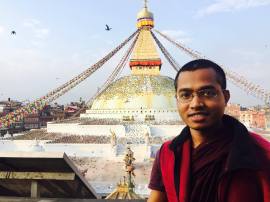The following is a conversation between a nun named Somā and the Māra (symbol of and anthromorphised for everything that is evil and negative – physically, psychologically, emotionally – barring one from progressing on the path of moral purification). One day the nun Somā went on her usual alms round and after having her fore-noon meal, she went into a forest named Andhavana for her solitary practice for the day. Then the Māra appeared there and said the following verse to discourage her from her practice, to “arouse fear, trepidation, and horripilation” in her, as the text says.
That state which sages obtain,
a very difficult feat indeed.
A woman of only two fingers’ length of wisdom,
is not able to accomplish that.
Soma realized that it is only the Māra who could say this kind of statements to discourage her from her practice. She then replied as follows –
Why would womanhood matter
when one’s mind is so well composed,
when there is knowledge flowing (smoothly),
and she properly sees the Dhamma?Māra’s trick applies only to those
who fret over, thinking –
“I am a male”; “I am a female”, or
“I am something else”.
Personally these are some of my most favorite verses in the Pāli literature. Māra’s remark here, I think, can be taken as a reflection of a general scornful attitude to women’s capabilities to do anything beyond the kitchen (here metaphorically referred to as two fingers’ length of wisdom as women use their fingers to measure the amount of water in a rice pot). It may sound insulting, but, Soma replies very calmly. The Bhikkhunīsaṁyutta of the Saṁyuttanikāya records some other instances of the Māra making similar disparaging remarks to dissuade Buddhist nuns from their practice. In each case the replies of the nuns are witty and powerful – challenging the Māra on his narrow understanding of women and their capacities. Instead of being agitated, the nuns, like Soma in this case, emphasize that in the context of practicing the dhamma, when one’s mind is well-composed, the very question of gender is irrelevant. Soma’s own accomplishments and her reply to the Māra can be very inspiring for us today, as we see so many people disrespecting women – even in Buddhist societies.
(The main passage can be found here as Somasutta. Some very good translations can also be found here and here. I like translating this kind of texts for my own practice, imperfect as my translations maybe right now. )
